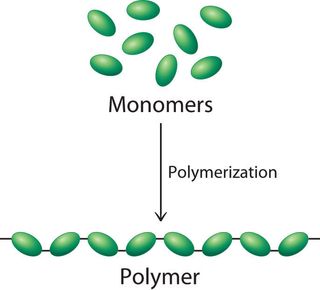Recycling Polymers: Promoting a Circular Economy
Recycling Polymers: Promoting a Circular Economy
Blog Article
Discovering the Varied Applications and Benefits of Polymers in Different Industries
Polymers, with their varied variety of residential or commercial properties and functionalities, have ended up being important in numerous markets, each reaping distinct advantages from their application. Polymers. From enhancing safety and security and performance in the automotive market to changing medical tools in the healthcare sector, polymers play a pivotal function. Additionally, their green nature is changing the landscape of sustainability methods. As we explore the midsts of polymers in electronics, we uncover sophisticated advancements, while their architectural stability transforms the world of construction and framework. The prevalent impact of polymers throughout industries is a testimony to their adaptability and versatility, forming the future of numerous markets.
Automotive Sector Applications
Polymers play a crucial function in improving the performance and longevity of various components within the automobile field. One popular usage of polymers in the auto industry is in the manufacturing of lightweight parts.

Health Care Sector Advantages
In different healthcare applications, the advantages of using polymers are commonly acknowledged for their varied series of advantageous homes. Polymers play an essential function in the health care market due to their convenience, biocompatibility, and cost-effectiveness. One of the main advantages of polymers in health care is their capacity to be customized to certain needs, such as versatility, sturdiness, and biodegradability, making them perfect for a large range of clinical applications.
Polymer-based materials are thoroughly made use of in medical tools, such as catheters, implants, prosthetics, and drug distribution systems, because of their biocompatibility and ability to imitate natural tissues. These products can decrease the danger of sensitive reactions or beings rejected, improving patient safety and security and outcomes. In addition, polymers are light-weight, making them ideal for wearable clinical gadgets and ensuring person convenience.
Furthermore, polymers allow the advancement of innovative therapy approaches, such as hydrogels for tissue engineering and nanocomposites for targeted medication distribution. Their convenience of handling and sanitation makes them essential for keeping high standards of health in medical care settings. In general, the diverse benefits of polymers contribute substantially to improvements in medical innovation and patient treatment.
Ecological Advantages of Polymers

Moreover, polymers can contribute to power cost savings due to their lightweight nature. In industries such as transport, light-weight polymer products can help in reducing fuel consumption and greenhouse gas discharges. In addition, polymers can allow the advancement of energy-efficient products such as insulation materials that improve power preservation in structures.
In addition, polymers play a critical function in minimizing water pollution. The use of polymer-based filtration systems can effectively eliminate toxins and impurities from wastewater, safeguarding water resources and communities. On the whole, the ecological benefits of polymers make them useful properties in promoting sustainability and environment-friendly methods across different industries.
Polymers in Electronic Devices and Technology
Taking into consideration the raising demand for cutting-edge and lasting options in modern-day markets, the assimilation of innovative polymer modern technologies in the realm of electronics and technology has become a pivotal approach for driving effectiveness and performance. Polymers have changed the electronic devices industry by enabling the manufacturing of lighter, much more flexible, and long lasting electronic devices. From mobile phones to medical devices, polymers play a crucial function in enhancing product style and capability.
One substantial benefit of polymers in electronics is their insulating residential or commercial properties, which aid protect fragile electronic parts from ecological elements and electrical disturbance. In addition, polymers are important in the growth of flexible displays, wearable modern technology, and published electronic devices, providing endless opportunities for producing wise and interconnected gadgets.
Additionally, making use of polymers in digital packaging has actually resulted in improvements in miniaturization and thermal monitoring, improving the general efficiency and reliability of electronic systems. As innovation continues to progress, the flexibility and flexibility of polymers will undoubtedly drive further innovation in the electronics sector, shaping the future index of innovation.
Duty of Polymers in Construction and Framework
The assimilation of advanced polymer products in construction and framework jobs has actually reinvented the way structures are created and constructed in contemporary times. Polymers offer various advantages in the building sector because of their versatility, resilience, and cost-effectiveness. One essential duty of polymers in building is their usage in finishes and sealers, giving protection versus environmental factors such as dampness, UV radiation, and deterioration. Furthermore, polymers are utilized in the manufacturing of light-weight and high-strength composite products, boosting the architectural honesty of structures while reducing total weight.
Moreover, polymers play a critical role in sustainable building and visit our website construction practices by allowing the advancement of energy-efficient frameworks. Shielding materials made from polymers help control interior temperature levels, decreasing the requirement for home heating and cooling down systems and inevitably lowering energy consumption - Polymers.
Final Thought
To conclude, polymers play a vital duty in numerous sectors such as automotive, healthcare, environmental, electronics, and building. Their functional buildings make them valuable in creating innovative solutions and products. From boosting gas efficiency in lorries to enhancing medical devices, polymers offer numerous advantages. Additionally, their effect on decreasing waste and promoting sustainability highlights their significance in modern applications. The widespread use polymers shows their substantial payment to progressing modern technology and enhancing quality of life.
Report this page